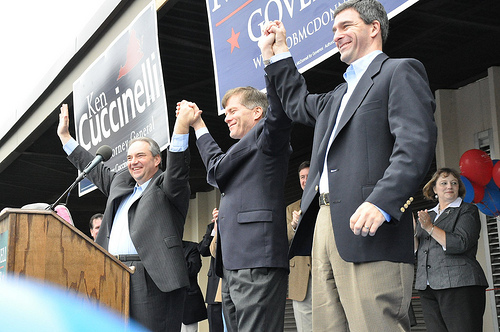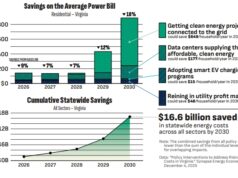 by Paul Goldman
by Paul Goldman
Before the Virginia GOP switched to a primary (assuming of course they don’t switch back again), Attorney General Ken Cuccinelli seemed determined to make what could have been a fatal political decision. The last four Republican Attorneys General – Jim Gilmore, Mark Earley, Jerry Kilgore and Bob McDonnell – nominated for Governor had all resigned as the gubernatorial year campaign season heated up in order to protect the integrity of the state’s top legal office from being seen as making decisions based on politics, not the law. Kilgore and McDonnell resigned early in the gubernatorial election year, while Earley and Gilmore waited until June.
Moreover none those Republicans faced a contested primary, leading to the public perception of their spending 24/7 on campaigning, as opposed to what they were being paid to do by the citizenry.
In 1977, when Attorney General Andrew Miller was the overwhelming favorite in the Democratic gubernatorial primary, he resigned in January. Jerry Baliles didn’t resign until June, only after he had won a hotly contested Convention fight in 1985. Despite being uncontested, Mary Sue Terry stepped down in January 1989, in good measure to ensure that her friends in the General Assembly, not Governor Doug Wilder, got to make the appointment.
Bottom line: The only Attorney General in modern times who refused to resign was J. Marshall Coleman, the 1981 GOP gubernatorial nominee. He had an uncontested run for the GOP nomination. It proved to be a big political mistake, given that it really only required him, based on the politics, to step down for five months.
Do the math: the AG is on the public payroll, receiving a salary and benefits for FULL TIME WORK when he is out campaigning essentially 24/7. He is issuing legal opinions and providing such advice in a required non-partisan, purely legal manner, while running for the most partisan office on the ballot. The “optics” for the voter is bad, the opportunity for his political opponent to make plausible charge about his lack of principles easy. It is lose-lose as they say.
In 1981, it was thus easy for Democrat Chuck Robb to put Coleman on the defensive with this issue for month after month. Finally, in desperation, Coleman announced that he would only take half pay. But this only proved his critics point! In effect he got the worst of both worlds.
Did it cost Coleman the election? Probably not, since the overall margin was sizable. But it could have, indeed would have, cost him a close race in my view.
ENTER NOW ATTORNEY GENERAL CUCCINELLI.
Last year, the AG said he was going to be the first in 30 years to follow the Coleman, not the last four Republicans and two Democrats.
By any reasonable analysis, any way you spin it, it is all downside, no upside, in terms of winning the gubernatorial election.
Moreover, Cuccinelli faced, at the time, an extended primary fight against Bolling.
Primary fights are public events, involving the whole state, all voters paying attention. Miller vs. Howell is the last contested primary for a gubernatorial nomination.
By not resigning, Cuccinelli seemed destined to be dogged by the charge of “playing politics with the AG’s office” for months inside his own party. It would have been one of the few “clean” Bolling issues, since by tradition, the LG has never resigned.
In part, that’s because the LG position is only part-time legally, and moreover, because the public knows the job has zero responsibilities! You basically run for LG to keep running for Governor in four years. OK, sometimes you also get to break a tie vote in the Senate when it is in session. But it isn’t a full time job with full-time pay. People get it.
The AG, on the other hand, is a real job, the top legal one in the state. It is full time.
SO THE CONVENTION PROCESS REALLY SAVES CUCCINELLI.
A Convention fight is a far different situation in terms of the public. In 1985, Jerry Bailies remained AG during a brutal convention fight with LG Dick Davis. In 2001, GOP AG Mark Earley took GOP LG John Hager in a convention contest.
However, given the nature of the process, their staying in office didn’t become an issue. The public doesn’t see them campaigning all around the state. Indeed, the way the delegate selection process works, the candidates are not really at the meetings where the people are chosen. The AG can easily do both in the real world, and the press knows it.
So Jerry and Mark could wait until the nomination battle ended to resign, and no one could get any real traction saying this impacted the integrity of the office, yada, yada, yada.
MEANING: Cuccinelli now has more time to rethink a potentially fatal decision. The pressure for him to resign during the nomination process has been effectively erased, given the Baliles example (note: Baliles is still active in legal circles, and will defend his decision).
THEN THERE IS THE MONEY ANGLE:
Baliles – if I remember – either went to “work” at one of the big law firms right after he resigned, or got paid by his campaign in some way – in order to pay the bills as he wasn’t a wealthy guy. I believe Mary Sue Terry got paid by her campaign. If I remember correctly, Gilmore and Kilgore went to “work” at one of the big law firms.
I can’t recall what McDonnell did, but since he resigned in February, no way he didn’t have a “job” for 9 months; he isn’t Mark Warner either.
THE POLITICS OF 2013: By going Convention, the GOP has actually given their favored candidate for the GUV job, Mr. Cuccinelli, a lot more time to rethink a very bad decision. They also have made it easier for him to go to “work” at a law firm and get a salary.
It may be that Cuccinelli objects to the ruse of “working” for a firm when in fact it is just a disguised campaign contribution that goes to the candidate personally.
Given Virginia’s minimal campaign finance laws, it is hard for anyone to have a “principled” objection to just anything except the receipt of unlaundered drug money. Let’s face it: there are no campaign finance “laws” in Virginia; the public seems to accept everything or be resigned to almost any scheme to raise almost any sum of money.
So, Mr. Cuccinelli has only one thing to worry about politically in this regard: the perception of campaigning full time while being paid by the taxpayer to do full-time work as AG.
MY BET: In the end, Cuccinelli will realize that getting roughly five months salary from the state by not resigning should he best Mr. Bolling in a convention is hardly worth the political risk created by remaining as AG during a tough general election.
So, Cuccinelli’s supporters in the VA GOP – clearly in charge right now – have done him a great favor even though he doesn’t yet appreciate it. But come June 2013, he very well may owe them a huge debt of gratitude.















